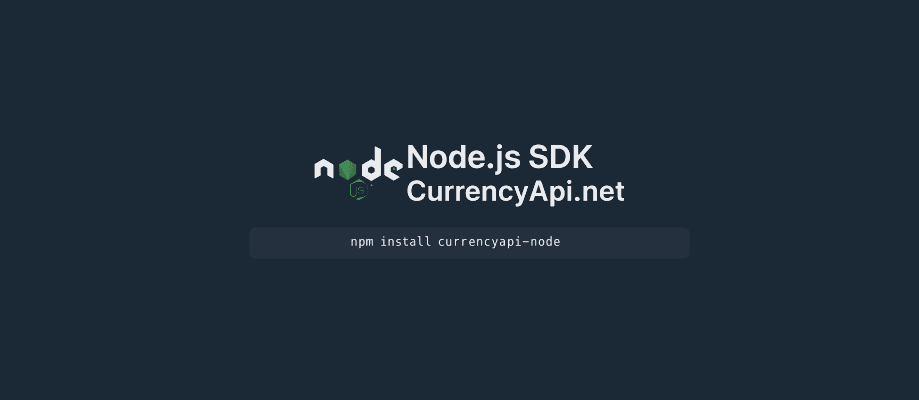Table of Contents
Table of Contents
Live Exchange Rates in NodeJS – NodeJS Currency API SDK

 Written by Oli Girling • Last updated: 21st February 2026 • Read time: 5–9 minutes
Written by Oli Girling • Last updated: 21st February 2026 • Read time: 5–9 minutes Getting live exchange rates in NodeJS shouldn't be complicated.
Luckily, with our currency api you can easily fetch currency rates in any language, including Javascript.
And with our NodeJS SDK you can integrate live exchange rates into your NodeJS projects in minutes.
Interested? By the end of this guide you'll be calling endpoints, parsing results, and wiring data into dashboards, jobs, or REST APIs.
Installation
To begin using the CurrencyApi.net NodeJS SDK, ensure you have Node v8 or higher installed (tested up to NodeJs v22.9.0).
Install via NPM and you’ll be ready to call the exchange rates api nodejs endpoints:
npm install currencyapi-nodeImporting the NodeJS SDK
After installation, include the SDK in your NodeJS project to start using our nodejs currency api:
import CurrencyApi from './src/CurrencyApi.js';Adding your API Key with NodeJS
You're all set to start leveraging the CurrencyApi.net NodeJS SDK. Begin by creating an instance of the CurrencyApi class with your API key:
const currency = new CurrencyApi('YOUR_API_KEY');Not got an API key yet?
Start building your next project with our NodeJS SDK. Get started with a free API key and start building your next project.
Fetching Live Currency Rates with NodeJS
Let's dive into fetching live currency rates using our exchange rates api nodejs flow:
const result = await currency.rates().get();
// Or using promises
currency.rates().get()
.then(console.log); This will output the response containing all the currency rates of the default base currency. The default is USD.
The rates() method is a convenient way to access the /rates endpoint.
Here's a complete example showcasing the API response:
import CurrencyApi from './src/CurrencyApi.js';
const currency = new CurrencyApi('YOUR_API_KEY');
(async () => {
try {
const result = await currency.rates().get();
console.log(result);
} catch (error) {
console.error(error);
}
})();Great! You've successfully retrieved live currency rates using our NodeJS SDK.
Available Methods for Rates Endpoint - NodeJS SDK
| Method | Description |
|---|---|
base() | Sets the base currency for conversions. Outputs all currency conversions for the specified currency. Default is USD. |
output() | Specifies the response format: JSON or XML. Default is JSON. |
Converting Currency Amounts
Easily convert amounts between currencies using our Currency API and NodeJS SDK. This method provides a streamlined response, optimizing performance and reducing data overhead.
The convert() method utilizes the /convert endpoint of our Currency API.
Let's convert 100 USD to EUR with the NodeJS SDK:
const result = await currency.convert().from('USD').to('EUR').amount(100).get();
console.log(result);As shown, the response is concise and contains only the necessary conversion details.
Available Methods for Convert Endpoint - NodeJS SDK
| Method | Description |
|---|---|
from() | The currency you want to convert from. Must be a three-letter ISO 4217 currency code. Required. |
to() | The currency you want to convert to. Must be a three-letter ISO 4217 currency code. Required. |
amount() | The amount you wish to convert. Should be a numerical value and can include decimals. Required. |
output() | Specifies the response format: JSON or XML. Default is JSON. |
NodeJS - Fetching Historical Currency Rates
Need historical currency data? Our SDK provides endpoints to access past currency rates with ease.
The history() method leverages the /history endpoint of our Currency API.
Retrieve historical rates for USD on January 1st, 2024 using the NodeJS SDK:
const result = await currency.history().date('2024-01-01').base('USD').output('JSON').get();
console.log(result);The response provides a JSON object with historical currency rates for the specified date.
Available Methods for History Endpoint with NodeJS SDK
| Method | Description |
|---|---|
date() | The specific date for which you want historical currency rates. Format: YYYY-MM-DD. Required. |
base() | Sets the base currency for conversions. Outputs all currency conversions for the specified currency. Default is USD. |
output() | Specifies the response format: JSON or XML. Default is JSON. |
Return Multiple Historical Day Rates with NodeJS
Accessing currency rates over a specific timeframe enables developers to build applications that monitor currency fluctuations over time, such as graphs, analytics dashboards, and more.
The timeframe() method utilizes the /timeframe endpoint of our Currency API.
Retrieve rates for USD between February 1st, 2023 and February 5th, 2023 using the NodeJS SDK:
const result = await currency.timeframe().startDate('2023-02-01').endDate('2023-02-05').get();
console.log(result);The API returns multiple days of currency rates in a single response, simplifying the process of tracking currency trends over time.
Available Methods for Timeframe Endpoint - NodeJS SDK
| Method | Description |
|---|---|
startDate() | The start date for the currency rate timeframe. Format: YYYY-MM-DD. Required. |
endDate() | The end date for the currency rate timeframe. Format: YYYY-MM-DD. Required. |
base() | Sets the base currency for conversions. Outputs all currency conversions for the specified currency. Default is USD. |
output() | Specifies the response format: JSON or XML. Default is JSON. |
Fetching OHLC Data with NodeJS
The ohlc() method gives you access to Open, High, Low, Close price data for a currency pair on a specific date — ideal for technical analysis, trading charts, and backtesting.
This endpoint was introduced in API v2 and is only available on the Professional plan.
Note that OHLC data is only available for dates within the last 30 days. Requesting a date older than that will return an error.
Here's how to fetch daily OHLC data for EUR/USD on 21st February 2026:
import CurrencyApi from './src/CurrencyApi.js';
const currency = new CurrencyApi('YOUR_API_KEY');
(async () => {
try {
const result = await currency
.ohlc()
.currency('EUR')
.date('2026-02-21')
.base('USD')
.interval('1d')
.get();
console.log(result);
} catch (error) {
console.error(error);
}
})()The response returns an array of OHLC candles for the requested date and interval, ready to be passed directly into your charting library of choice.
Available Methods for OHLC Endpoint - NodeJS SDK
| Method | Description |
|---|---|
currency() | The target currency code to get OHLC data for (e.g., EUR, GBP, BTC). Required. |
date() | The date you wish to retrieve OHLC data for. Format: YYYY-MM-DD. Must be within the last 30 days. Required. |
base() | The base currency for the pair (e.g., USD, EUR). Default is USD. |
interval() | Time interval for OHLC candles. Allowed values: 5m, 15m, 30m, 1h, 4h, 12h, 1d. Default is 1d. |
Best Practices
To ensure a smooth and efficient integration with the NodeJS SDK, adhere to the following best practices:
- Cache API responses when appropriate to minimize redundant API calls and enhance performance.
- Implement robust error handling to gracefully manage unexpected issues and maintain application stability.
- Securely store your API key using environment variables to protect sensitive information.
- Regularly consult the official documentation for updates and advanced usage techniques.
Handling Responses
JSON Response
By default, the SDK returns responses in JSON format. This makes it straightforward to work with the data directly within your NodeJS applications.
XML Response
You can opt for XML responses by specifying the output parameter. Here's how to retrieve and handle XML responses:
const result = await currency.rates().output('XML').get();
console.log(result);To process the XML response in NodeJS, you can use the xml2js library:
import CurrencyApi from './src/CurrencyApi.js';
const xml2js = require('xml2js');
const currency = new CurrencyApi('YOUR_API_KEY');
(async () => {
try {
const result = await currency.rates().output('XML').get();
xml2js.parseString(result, (err, result) => {
if (err) {
throw err;
}
const rates = result.root.rates[0];
for (const [currency, rate] of Object.entries(rates)) {
console.log(`Currency: ${currency}, Rate: ${rate}`);
}
});
} catch (error) {
console.error(error);
}
})();Looping Over the JSON Response in NodeJS
To iterate through the JSON response and utilize the data effectively in your application:
const result = await currency.rates().get();
const baseCurrency = result.base;
const rates = result.rates;
console.log(`Base Currency: ${baseCurrency}`);
for (const [currency, rate] of Object.entries(rates)) {
console.log(`${currency}: ${rate}`);
}Error Handling - NodeJS SDK
Effective error handling ensures your application remains resilient and provides meaningful feedback to users:
try {
const result = await currency.rates().get();
console.log(result);
} catch (error) {
console.error(`An error occurred: ${error.message}`);
}Integrating into Your NodeJS Application
Integrate the CurrencyApi.net NodeJS SDK seamlessly into your NodeJS applications, whether you're building REST APIs, real-time services, or data processing tools.
Here's an example of a simple currency converter function within a NodeJS application:
import CurrencyApi from './src/CurrencyApi.js';
const currency = new CurrencyApi('YOUR_API_KEY');
async function convertCurrency(amount, fromCurrency, toCurrency) {
try {
const result = await currency.convert()
.from(fromCurrency)
.to(toCurrency)
.amount(amount)
.get();
return result.conversion.result;
} catch (error) {
throw new Error(`Conversion failed: ${error.message}`);
}
}
(async () => {
try {
const converted = await convertCurrency(100, 'BTC', 'USD');
console.log(`100 BTC is equal to ${converted} USD`);
} catch (error) {
console.error(error);
}
})();Conclusion
The CurrencyApi.net NodeJS SDK offers a straightforward and efficient method to integrate live currency rates into your NodeJS applications. With easy setup, comprehensive documentation, and dependable support, enhancing your projects with up-to-date currency data has never been easier.
Other Useful Links:
Explore Other SDKs
Not working with NodeJS? Explore our other SDKs tailored for different programming languages:
Python SDK
Effortlessly incorporate live currency data into your Python applications with our intuitive SDK. Access real-time exchange rates, currency conversions, and more.
Explore the Python SDK →GoLang SDK
Quickly implement currency data into your GoLang applications with our user-friendly SDK. Access live exchange rates, currency conversions, and more.
Explore the GoLang SDK →PHP SDK
Seamlessly connect to our Currency API from your PHP applications. This SDK ensures smooth and efficient access to the latest currency rates and services.
Check out the PHP SDK →Integrate currency rates into your NodeJS applications today!
We offer free and paid plans to suit your needs.